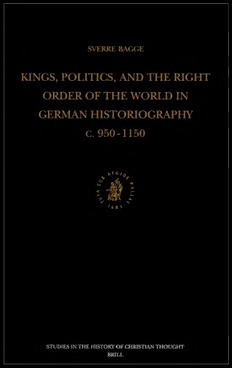
Kings, Politics, and the Right Order of the World in German Historiography: C. 950-1150 (Studies in the History of Christian Thought) (Studies in the History of Christian Thought) PDF
460 Pages·2002·23.995 MB·English
Most books are stored in the elastic cloud where traffic is expensive. For this reason, we have a limit on daily download.
Preview Kings, Politics, and the Right Order of the World in German Historiography: C. 950-1150 (Studies in the History of Christian Thought) (Studies in the History of Christian Thought)
Description:
A discussion of German historiography from around 950 to 1150, through a close examination of six works. In contrast to most earlier scholarship, it focuses on the narrative as an expression of the author's way of finding meaning in the sequence of events, and as evidence for their understanding of society, politics and human behaviour. In particular, it is shown that changing attitudes to society are reflected in the different ways the narrative is organized and individuals and their actions are represented. While the earlier works depict a society based on face-to-face relationships, the idea of an organized community, governed by the king as God's representative, becomes increasingly prominent in the later ones. Finally, the results of the analysis are discussed against the backdrop of more general trends in mediaeval political and intellectual history.
See more
The list of books you might like
Most books are stored in the elastic cloud where traffic is expensive. For this reason, we have a limit on daily download.
